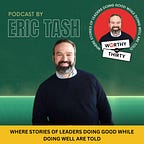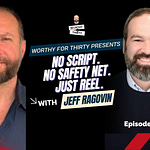In a highly thought-provoking and insightful episode, Gloria Hwang, founder and CEO of Thousand, a company revolutionizing urban mobility with stylish helmets, lights, and bags, shares her inspiring journey from non-profit work to building a successful for-profit venture with a powerful mission. For entrepreneurs, founders, investors, and C-suite professionals, her story offers salient takeaways on purpose-driven business, community building, and strategic growth.
It was great to record in person with show guest and supporter, Elissa Kalver, Founder, WeGotThis.org. The first non-profit gift registry for cancer patients, thrivers, and their loved ones. (Check out their new revamped website)
Thank you, Boardy.Ai for the connection to Gloria!
🔑 Takeaways with Action Steps:
Anchor Your Business in a Deeply Personal Mission: Gloria’s motivation for founding Thousand stemmed from a tragic personal loss, driving her to create a product that encourages safety through style. This deeply personal connection to her mission – to save a thousand lives – resonates with customers and fuels the brand's authenticity.
Action Step: Reflect on the core problem your business solves. Is there a personal story or a profound impact you aspire to make that can serve as the bedrock of your brand's purpose? Consider how companies like Patagonia (environmental activism woven into their outdoor gear) or Warby Parker (providing affordable, stylish eyewear while addressing vision care globally) have successfully integrated a strong mission into their business model.
Validate Your Product and Build Community Through Crowdfunding: Gloria successfully launched Thousand through a Kickstarter campaign, raising nearly a quarter-million dollars. This not only provided crucial early funding but also validated the market need and fostered a passionate community around the brand before mass production.
Action Step: For new ventures or product launches, explore crowdfunding platforms to gauge market interest, secure initial capital, and cultivate a loyal customer base. This approach can potentially de-risk your idea and provide invaluable early feedback, similar to how many innovative tech gadgets and indie games gain traction and funding on platforms like Kickstarter or Indiegogo.
Prioritize Customer Connection and Understanding: She emphasizes the importance of staying connected with customers to understand their evolving needs. Thousand’s focus on the "everyday rider" rather than just hardcore cyclists demonstrates a clear understanding of their target audience and their desire for practical yet stylish solutions.
Action Step: Implement mechanisms for continuous customer feedback, whether through surveys, social media engagement, or direct outreach. Regularly analyze customer data to refine your product offerings and marketing strategies. Brands like Netflix (constantly analyzing viewing habits to recommend content) and Spotify (personalizing music experiences) excel at leveraging customer data to enhance their offerings.
Even Lyft’s CEO is a Lyft driver every 6 weeks to understand the experience and to stay connected to both drivers and riders!
Embrace Your Strengths and Delegate Effectively: As a founder, Gloria highlights the necessity of recognizing one's core competencies and strategically delegating tasks that fall outside of those strengths. Make your A’s, A+ and delegate the B’s to someone who can make them A+’s. This allows for focused effort on high-impact areas and empowers team members.
Action Step: Conduct a personal skills audit to identify your strengths and weaknesses. Build a team that complements your abilities and trust them with decision-making power in their areas of expertise. Think about how Apple's success is often attributed to Steve Jobs' vision, but also to his ability to delegate engineering and design to highly skilled teams.
Cultivate a Lean, Empowered, and Growth-Oriented Team: Her approach to team building focuses on efficiency, talent retention, and providing opportunities for growth and decision-making. This fosters a strong, motivated, and agile workforce.
Action Step: Design a company culture that prioritizes autonomy, professional development, and clear pathways for advancement. Empower your team members to take ownership of their work and contribute to strategic decisions. Companies like Google and Zappos are renowned for their employee-centric cultures that encourage innovation and growth.
Gloria Hwang’s journey with Thousand is a powerful testament to the impact of combining a heartfelt mission with strategic business acumen. By leading with intentionality, this begets authenticity, leveraging community, and building strong teams. Founders can not only create successful companies but also drive meaningful change.










